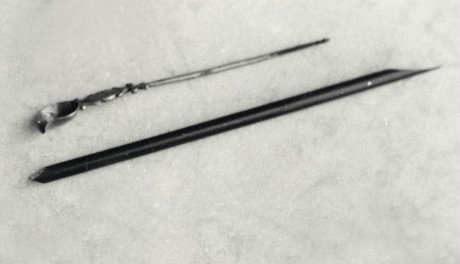The views expressed in our content reflect individual perspectives and do not represent the authoritative views of the Baha'i Faith.
Baha’u’llah’s years at Bahji were noteworthy for the constant stream of writings that poured from his pen. Baha’is regard these writings as sacred scripture, direct revelation from God. Baha’u’llah compared them to a vast ocean, and they are indeed voluminous, comprising over the course of his forty-year ministry a total of some one hundred volumes.

Cut-reed pen and ink spoon used by Baha’u’lláh © Bahá’í International Community
In his writings Baha’u’llah deals with virtually every aspect of spiritual reality and the human condition. He wrote in various styles, always in superb, elevated language. Often he wrote replies to letters sent to him by believers. His mastery of both Persian and Arabic caused his works to be hailed in his own day by friend and stranger alike as masterpieces of literary expression. Even his enemies conceded this. This ability would have been an extraordinary achievement in its own right, especially with regard to literary Arabic, which normally required a lifetime of intensive study and practice to acquire. But it is all the more remarkable when one realizes that Baha’u’llah received little formal education while growing up.
As the son of a nobleman, Baha’u’llah received a traditional aristocratic education. This meant a rudimentary exposure to the Qur’an and to the works of some Persian poets and a concentration on penmanship. Functional literacy was all that was normally required for a person of his position. In addition, young nobles typically learned such skills as riding, fencing, and hunting, for these were in keeping with their station in life. This was quite different from the training received by religious scholars, who often devoted their entire lives to the acquisition of Arabic and to refining their stylistic skills. Such persons also spent years studying philosophy and theology, and in the end only a few were ever regarded as having attained thorough knowledge of these subjects.
Baha’u’llah–considered a prodigy because of his apparently effortless mastery of literary forms of Arabic—also had profound insight into religious and social issues. People were amazed to learn that he had never received formal religious training. Baha’u’llah himself asserted that his knowledge was bestowed upon him by God, and that his writings were the greatest proof of his claim to prophethood after his own person. In his letter to the shah of Persia, he stated that his learning was not of this world and challenged the shah to verify for himself that he had received no formal education. Many observers were astonished at the ease with which Baha’u’llah referenced the works of other writers, often referring to them in depth even though he had never actually read them. He stated that this ability was divinely conferred. He wrote to one believer:
Thou knowest full well that We perused not the books which men possess and We acquired not the learning current amongst them, and yet whenever We desire to quote the sayings of the learned and of the wise, presently there will appear before the face of thy Lord in the form of a tablet all that which hath appeared in the world and is revealed in the Holy Books and Scriptures. Thus do We set down in writing that which the eye perceiveth. Verily His knowledge encompasseth the earth and the heavens. – Tablets of Baha’u’llah, p. 149.
Baha’u’llah also composed his writings in a truly remarkable way. He usually dictated to his secretary in a continuous flow, often speaking so rapidly that the secretary could barely keep up. Eyewitnesses testified to the awesome spiritual power that filled the room whenever he revealed the Word of God. At such times his words came out like a rushing torrent. This he did sometimes for hours on end, even under the most adverse conditions such as illness, grief, or exhaustion. One eyewitness wrote:
Day and night the Divine verses were raining down in such number that it was impossible to record them. Mirza Aqa Jan [Baha’u’llah’s secretary] wrote them as they were dictated, while the Most Great Branch [Abdu’l-Baha] was continually occupied in transcribing them. There was not a moment to spare. – quoted by Shoghi Effendi in God Passes By, pp. 170-171.
“A number of secretaries,” the historian Nabil testified, “were busy day and night and yet they were unable to cope with the task. Among them was Mirza Baqir-i-Shirazi…. He alone transcribed no less than two thousand verses every day. He labored during six or seven months. Every month the equivalent of several volumes would be transcribed by him and sent to Persia. About twenty volumes, in his fine penmanship, he left behind as a remembrance for Mirza Aqa Jan.” – Siyyid Asadu’llah-i-Qumi, quoted in Adib Taherzadeh’s Revelation of Baha’u’llah, Volume 1, pp. 35-36.
Baha’u’llah, himself, referring to the verses revealed by him, has written:
Such are the outpourings . . . from the clouds of Divine Bounty that within the space of an hour the equivalent of a thousand verses hath been revealed… I swear by God!” In those days the equivalent of all that hath been sent down aforetime unto the Prophets hath been revealed. That which hath already been revealed in this land (Adrianople), secretaries are incapable of transcribing. It has, therefore, remained for the most part untranscribed. – Tablets of Baha’u’llah, p. 149.
When Baha’u’llah finished, his secretaries would make a clean copy. Occasionally he made corrections due to errors made by the assistants. Then the document would sometimes receive a seal indicating his approval. Thus–for the first time in the history of religion–the personally authenticated writings of a messenger of God are available for anyone to read and study.
















Comments
Sign in or create an account
Continue with Googleor